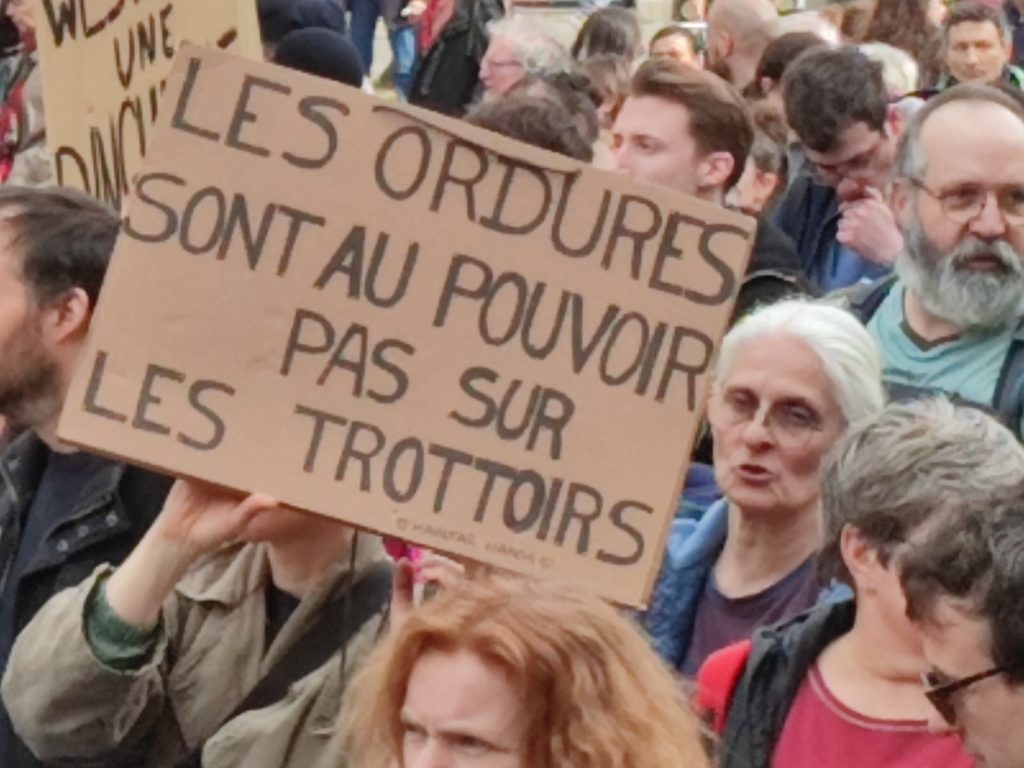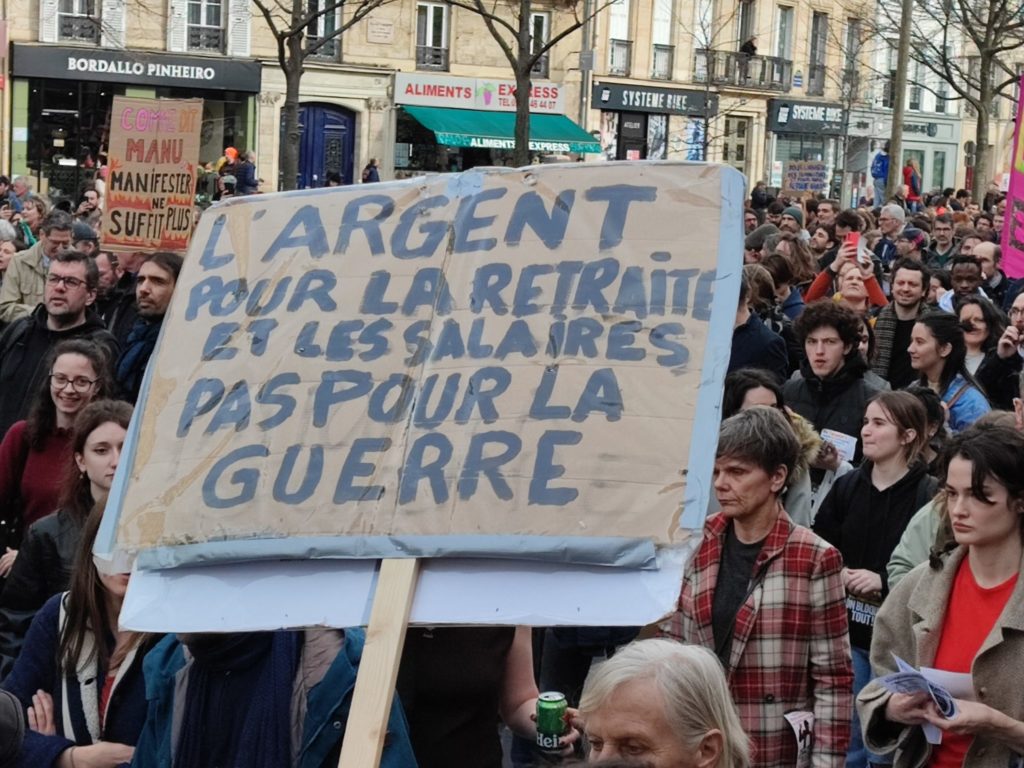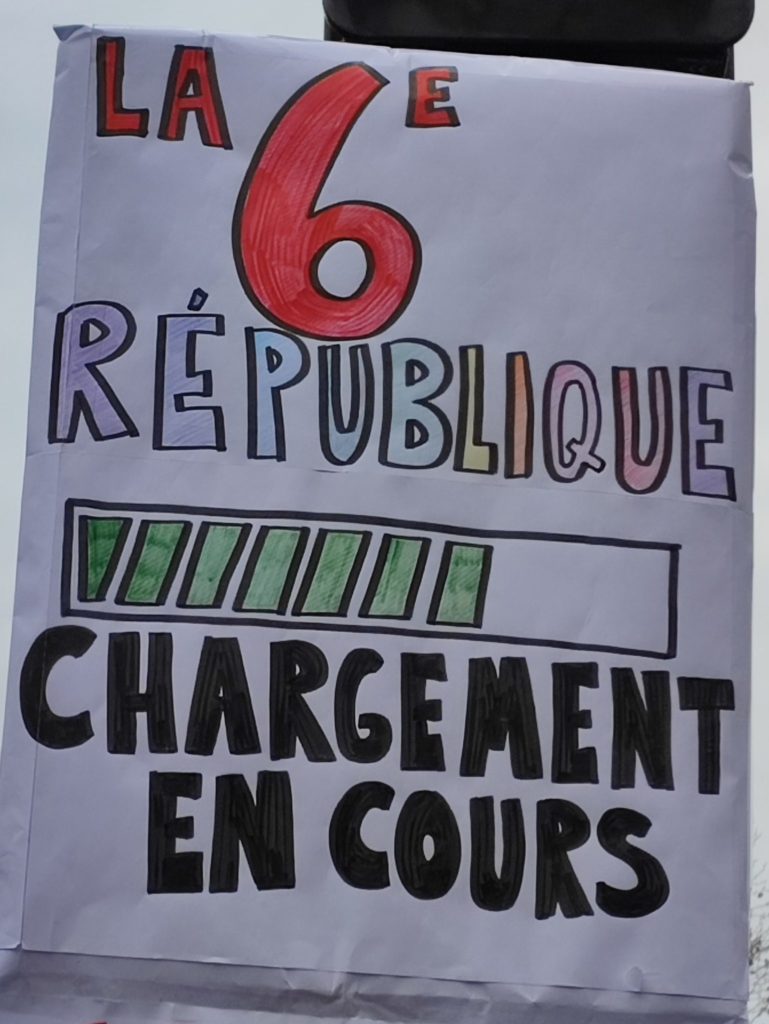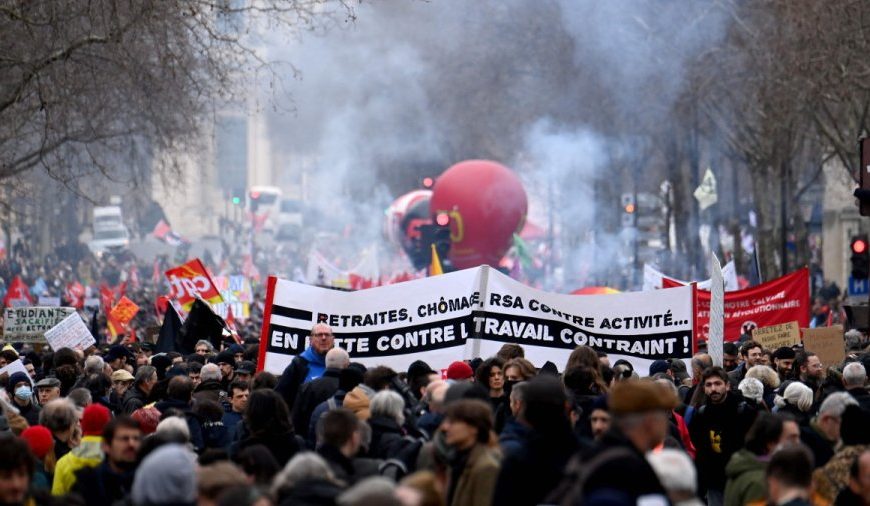Still upright, the Union Syndicale decided after two months to bring the country to a standstill. The Paris metro, railways, road workers, civil aviation, the metallurgy sectors, refineries, gas and electricians, hospital staff, teachers, garbage collectors, went on strike and blocked the sites. They were joined by the college and lycée students, and faculties were occupied.
The Senate[1] voted the famous article 7 of the reform, the one that sees retirement age passing from 62 to 64, without however getting the full vote of the right. This is how, for fear of seeing the reform rejected, the government decided to apply the procedure of article 44.3 of the Constitution aimed at imposing the entire bill without the possibility of amendments. The amendments made by the left and the alternative texts which proposed another financing of pensions could not therefore be submitted to examination and discussion by the senators.
The bill was passed by the Senate by 195 votes to 112, after 10 days of maneuvers to reduce debating time as much as possible. It then went through a joint commission which had to rewrite the text so that it could again be brought to the National Assembly on March 16. But once again the expected result did not take place: the government imposed the text through the procedure of article 49.3 instead of proceeding to the vote on the bill – revealing in this way how anxious it was to get the reform passed come what may, so uncertain was the outcome of this vote.

The workers decided to open another stage of the social movement
All the way to the withdrawal of the reform
The brutal way the government imposed a reform so contested by the majority of the population was seen by all as contempt for the workers and an attack on democracy. The use of the 49.3 procedure has generated an unprecedented resurgence of social explosion. There was a charged atmosphere at the National Assembly where the Prime Minister (Elizabeth Borne) made her speech in the most complete chaos. And in the streets of Paris, Place de la Concorde, the spontaneous demonstrations were charged by police with water cannons.
The workers decided to open another stage of the social movement. Electricity and gas were cut in places where important events were to take place, wild parades in several cities of the country, rallies in front of town halls, garbage-bins set on fire, blockages of railway tracks, of major ports by the dockers, Olympic Games construction sites.
The fight of the Paris garbage collectors was formidable. Day after day, tons of waste piled up in the streets. The workers decreed that the collection would only resume when the pension reform was placed in the bin. With their action, they showed how much their work is essential to society. Police forces tried to dislodge the pickets blocking the incinerators; the Prefecture[2] requisitioned private sector employees to do the garbage collection but this did not stop the workers from getting on with their movement.
New constitutional levers are being looked for, a motion of censure, some recourse to the opinion of the Constitutional Council[3] or the setting up of a referendum of shared initiative, to find some way to bring into question the very essence of this reform and prevent its implementation. But these ploys did not have the desired effect. The vote failed on a motion of censure tabled by a group from various backgrounds (Freedoms, Independents, Overseas and Territories, LIOT). This was followed by the deputies of the New Popular Ecological and Social Union (Nupes) who failed by 9 votes. The Constitutional Council then ruled that this pension reform was in accordance with the Constitution.
An increasingly hardened situation has arisen. The workers keep renewing the strike movements and calls for demonstrations on a one hand, and on the other, the Minister of the Interior (Home Office) calls on the prefects[4] not to let anything pass, to prevent the acts of economic blockades, and therefore increase the repressive force.
The radicalization of the social movement has triggered a very important (level of) repression upon the workers, the trade unionists in particular, criminalizing their actions, trying to intimidate them, physically attacking them, finding articles in texts to break the right to strike, as well as to encourage employers to dismiss protected employees for “unlawful acts” or for “obstructing the freedom to work of non-strikers”.
The demonstrations multiplied as the gatherings were getting banned. People are put under close surveillance, police violence at work everywhere, with numerous arrests, arbitrary arrests, systematic searches of everyone, including passers-by. The escalation of repression has spread everywhere with more and more police and gendarmerie forces[5] to control the processions, to “kettle” the demonstrators; and this with the return to the streets of the BRAV-M[6] – the Brigades de Répression de l’action violente motorisée. violent motorized action – set up at the time of the Yellow Vests’ mobilisations.
The situation became so tense that some police officers refused to continue on this path, stating that the country was on the eve of an insurrection and that it was not possible to charge demonstrators who were defending a cause which they thought just. On certain blockaded industrial sites, support for the pickets was so great that, faced with the unequal balance of power, the police did not complete the mop-up actions they were sent to carry out.
The political divide is very wide across the country. Some right-wing deputies did not follow the government’s voting instructions in a climate where the demonstrators went so far as to attack parliamentary offices, insulting their elected officials of whom they say they are ashamed! Macron made a speech on television at 1 p.m. on March 22, when only the so-called “inactive” were home for lunch. He told us in essence that this reform must go to completion because it is in the “interest of the nation”, showing his great disconnection with the real social situation for which he is responsible. He talks to us about full employment and reindustrialization while social plans continue to be put in place, as at Orange Business for example, which announces a reduction of 700 jobs while the State is the group’s largest shareholder.
He repeats endlessly that the French have not understood the meaning of the pension reform. But we have all understood alright that social justice was never to be found in this country, and in the liberal system in general; we have understood that the ultra-rich are to continue to pay half the taxes of the rest of the population compared to income, and that inequalities are to continue. We have understood that the arguments put forward by this government for not taxing capital income have no basis and have never been proven, such as “the risk of economic bankruptcy” should the pension reform fail to pass. And how can one accept the war economy imposed on us, where the projected military plan for 2024-2030 reaches €413 billion – a 40% increase on previous, to modernize and repair our armaments and above all finance the military aid to Ukraine?

Demonstrations, Paris 23 Mars 2023
The internal war: all terrorists
We saw how far this government is ready to go on the 25 March when there was confrontation at Sainte-Soline in Deux-Sèvres (Central-West of France). What people demanded was a reasonable management of the mega-basins[7]. 30,000 protesters marched through fields to prevent water-grabbing by a few big farmers who bend the rules on drought restrictions. There, they faced a cordon of heavily armed police defending a huge hole in the ground collecting water pumped up from the water-table! The would have been laughable except for the use made, in a few hours, of more than 5,000 tear-gas and dis-encirclement grenades[8], weapons of war and whatever the Minister of the Interior says, that left more than 500 wounded, some of them very seriously.
Two visions of agriculture were facing each other here: the one of the small farmers, as opposed to that of agribusiness supported by political power and media in the hands of billionaires. The televisions and the media showed only the violent clashes between police and the demonstrators, and absolutely nothing about the activists who were replanting hedges, at the time, to help the infiltration of [rain] water into the ground. All the participants in this mobilization were put on file and branded ‘eco-terrorists’, with car searches and systematic identity checks. But the management of water as a common good, along with what agriculture and what food is needed, are totally legitimate questions, that must be reconsidered all the more seriously given the scale of climate change.
Sainte-Soline is the beginning of a new stage. The level of violence from the government has been unprecedented. As the protesters who fight for the right to water are all said to undermine democracy, this seriously challenges the rule of law. The level of solidarity was immense on the other hand, in the mutual aid when help was not coming, in the intelligence of the debates, in the acute consciousness of everyone that, to change society, one must confront those who protect the activities that destroy the world.
Since Sainte-Soline, anyone fighting the government’s ideology is part of the “ultra-left”, in the fight for pensions or in the fight for water as a public good. The Minister of the Interior, Gérald Darmanin, is pitching for the strategy of chaos. To discredit the left, he selects the untruths that hold it responsible for all the violences. He wants to intimidate with his talk of dissolving ‘The Uprising of the Earth’[9]. The latter is a coordination of a hundred organizations and associations. It grew out the ZAD of Notre-Dame-des-Landes (to defend environmental causes), out also of the cuts to the League of Human Rights whose detailed reports on the state of the public freedoms and on BRAV-M’s behaviour against demonstrators do not please. (BRAV-M are the special mobile police units that use motorcycles).
In front of a social situation going beyond its control, this government shows its great weakness. In spite of all the repression, all it achieves is to make the population increasingly aware that the battle against pension reform. and the battle for the environment, have the same roots. And that these battles cannot be won through parliamentary debates alone.
Macron showed his inflexibility by enacting the law on pensions in the middle of the night on April 15 as soon as the opinion of the Constitutional Council was announced. The struggles continue and take new forms – no one wants to let go. Derision becomes a weapon of mass destruction: each time Macron or his representatives decide to show up, a welcoming party gets going with pans, whistles, boos, red cards and power cuts.
On April 17, Macron re-addressed the public in a televised speech. This time however, he was accompanied by thousands of pans being struck in front of the town halls of the communes, to the chant of “He doesn’t hear us, so we won’t hear him either”. He called himself ready to learn the lessons of the social movement and admitted that the pension reform had obviously not been accepted: What insight! Then he gave himself “100 days to draft a roadmap of appeasement, unity, ambition and action in the service of France” with stock taking on July 14. Remember that Napoleon completed his 100 days well before him, which led to his defeat at Waterloo, and exile! Let’s just hope that Macron will succeed in doing the same…
In return, the French promised him 100 days of anger and fracas against appeasement. And it is not as if the reasons for anger were missing, what with the immigration bill, delayed but about to return before the year is out. With great brilliance and imagination, the whole social movement resists the absurdity of a government reaching for an anti-terrorist law to ban saucepans and other “portable sounding devices”!
Today and in all circumstances, you may go walk-about while listening to a casserole and whistle concert, on your phone. Digital pros have concocted a new logo for the Olympic Games where the Olympic circles end with tails of saucepans. A website lists “100 days of zbeul” (translation: disorder)[10]. Parodies of Macron abound everywhere. A competition has been launched between cities – reward to the best at noise and disorder. Counter-events with BRAVES Concerts[11] – against the repressive forces of the same name – are there to raise money in aid to the strike fund.
And then, what?
The social movement has shown all its determination and called for a May Day fight. This year, the 100 days will end on July 14 – the celebration of the storming of La Bastille in 1789 and symbol of the French Revolution – a day likely to turn out memorable. In any case, the unions are filling up with new members as the struggles continue. But then what are we planning to do?
The social situation has made it possible to unite the 8 main trade unions and it has made a show of essential unity from the start of the struggle. But this unity remains fragile. It could weaken very considerably in the current climate of tension. We saw this in the actions recently announced by the CGT outside the remit of the Intersyndicale[12] and their “grévilla”, a word invented to speak of a mixture between strike and guerrilla. We also saw this (fragility) at the CGT congress in Clermont-Ferrand at the end of March, with the need for another form of trade unionism, more rooted in the political analysis of the capitalist crisis and the class struggle.
In that congress, the need to focus on the pensions was strongly felt. This showed first of all in the way the activity report was rejected – a first in the history of the union, a lack of consensus vis-à-vis the policy imposed from above and insufficiently shared by all the militants. There have been also at the centre of the debates the way to carry out the energy transition in sync with the preservation of employment, and the impossibility of mediation with a government that has declared war on the workers. The election of the new CGT general secretary was another point of disagreement, with the majority of activists rejecting the proposed candidates, before finding an acceptable solution with the election of Sophie Binet, the first woman to be elected head of the CGT since its creation.

Paris demonstration 6 April 2023
The other important congress during the (pensions) mobilizations was that of the Communist Party in Marseilles from April 7 to 10. There was no shortage of topics for discussion with 5,000 amendments proposed by militants to a text of general orientation approved at 80%. The centre of the debate was on strategy. The national secretary, Fabien Roussel, called for the return of a visible CP in the elections and launched an appeal for a new Popular Front, the majority of which would be able to win and beat the far right, to unite beyond the Nupes which he considers outdated.
This vision of a new Popular Front raises a number of questions: what union, with whom, on what program and for what purpose? Even if the Nupes is only an electoral agreement, even if La France Insoumise must greatly improve its internal functioning, the shared government program that has been established collectively between left-wing parties, unions, associations and citizens does indeed exist. It exists with points of disagreement that were to be debated later, in particular on employment, ecology, energy transition, tax justice, the Sixth Republic, the position vis-à-vis NATO and the European Union. What do we do with this discussion that did not take place? What are we doing so that the Nupes goes beyond its own limits and becomes a real tool for debate on how to replace the capitalist system and how to build the society of tomorrow?
To say that the Nupes is outdated because it could not have won the last elections is an absurdity. The union of the left is a necessity to beat the right and the extreme right, but this cannot be done just anyhow, or through agreements at the tops. As long as the parties of the left, whatever they are, continue to think in terms of electoral imperatives and of the number of elected representatives to bag; without carrying out the necessary debates with the militants and the whole of the population, these parties will not win the results and convincing changes that regain the popular classes who no longer vote. This requires a process of reflection, discussion, maturation, fuelled by social movements, alternative actions on the ground, the organization of popular assemblies aimed at building counter-powers organising themselves in line with the decisions taken collectively.
Macron represents the big bourgeoisie and finance, and he acts accordingly. He has also decided not to let go, to go to the end of the reforms he wants to put in place. To do this, his government applies a strategy of marginalization of the political left, the demonization of the ecological and environmental movements and that of the social movement in its great diversity. It uses and abuses the means of repression to impose its policy. It opens a virtually limitless space to the advance of the far-right ideas which can implement its racist and xenophobic actions throughout the territory without being worried.
We have therefore arrived at a situation requiring another level of response from the trade union organizations and the political parties. A test of strength is wanted in the face of an authoritarian power which is seeking to bring to heel any opposition or act of resistance, to prevent any political and social transformation. The social movement, with all the energy and determination it has deployed over the past 4 months, has shown the limits of its power to mobilize to impose real change on this government. But it is not just the government. The left-wing political parties have also demonstrated their weakness in recent months, with internal crises and splits narrowly avoided. Here is the core of the debate to be held today inside the left: how to organize together to respond to all these challenges, to advance the program of economic and social transformation for a real change in society.
The Posadists – April 28, 2023
Feature image: Demonstrations Place de la Republique, Paris in March 2023.
[1] In France, the senate is the upper chamber. It emanates from Metropolitan authorities, the overseas territories and citizens living abroad.
[2] In Paris, the Prefecture controls police and fire services, as well as local authority matters.
[3] The Constitutional Council is a court that can review the constitutionality of legislation.
[4] A prefect is a high government official standing between central and local government, expected to carry out locally, the decisions taken at central level, without criticism.
[5] The Gendarmerie is the military police of the French army. In metropolitan France, its officers are deployed from units of the Departmental Gendarmerie.
[6] BRAV-M is a special police unit operating in mobile brigades of motorcycles with two on each.
[7] The ‘mega-basins’ in France are huge reservoirs dug up in fields where rain water is stored for use by farmers during the dryer summer months.
[8] A grenade of ‘desencerclement’ is a sting-ball grenade hand-thrown by police. It contains rubber pallets.
[9] The organisation called ‘Soulevement de la Terre’ was main organiser of the evens at Sainte Soline, along with the Confederation Paysanne and the Collectif ‘Basins, No thank you’.
[10] ‘Zbeul’ is a way to joke around the word bordel all jumbled up.
[11] “Some of us are BRAVE”: live session at Petit Pain, Paris. Big BRAVE Tour Lyon Sonic. Lonely The BRAVE, Music Event in Paris.
[12] Intersyndicale: In France: there are trade union united fronts in the enterprises. And since 2008, an ‘Interprofessional Intersyndicale’ has been operating uniting CGT, CFDT, FO, CFCC, CFE, CGC, UNSA, Solidaires and FSU. Together, they have created a platform of joint demands. They are sometimes joined by student trade unions and equivalent in the Lycées.
















